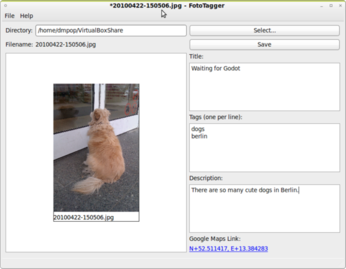Tweak Photo Metadata with FotoTagger

Productivity Sauce
Need to quickly add a title or tags to a few photos? You can use a full-blown photo management application like digiKam for that, but the FotoTagger tool might be a better tool for the job. This lightweight utility allows you to quickly add titles, tags, and descriptions to your photos. Although FotoTagger does only one thing, it does it fast and with a minimum of fuss, which makes it a good alternative to a heavyweight photo application.
FotoTagger is written in Python, and to make it work on your machine you have to install the python-qt4 and python-pyexiv2 packages and their dependencies. On Ubuntu, you can do this using the sudo apt-get install python-qt4 python-pyexiv2 command.
Grab then the latest release of FotoTagger and unpack the downloaded archive. In the terminal, switch to the resulting directory and launch FotoTagger using the python fototagger.py command.
Using FotoTagger is ridiculously easy. Press the Select button to pick the directory containing the photos you want to edit. Once the photos are loaded into the application, select a single photo and enter a title, tags, and a description in the appropriate fields. Hit the Save button to write the provided data into the photo's metadata. That's all there is to it.
comments powered by DisqusSubscribe to our Linux Newsletters
Find Linux and Open Source Jobs
Subscribe to our ADMIN Newsletters
Support Our Work
Linux Magazine content is made possible with support from readers like you. Please consider contributing when you’ve found an article to be beneficial.

News
-
The Next Linux Kernel Turns 7.0
Linus Torvalds has announced that after Linux kernel 6.19, we'll finally reach the 7.0 iteration stage.
-
Linux From Scratch Drops SysVinit Support
LFS will no longer support SysVinit.
-
LibreOffice 26.2 Now Available
With new features, improvements, and bug fixes, LibreOffice 26.2 delivers a modern, polished office suite without compromise.
-
Linux Kernel Project Releases Project Continuity Document
What happens to Linux when there's no Linus? It's a question many of us have asked over the years, and it seems it's also on the minds of the Linux kernel project.
-
Mecha Systems Introduces Linux Handheld
Mecha Systems has revealed its Mecha Comet, a new handheld computer powered by – you guessed it – Linux.
-
MX Linux 25.1 Features Dual Init System ISO
The latest release of MX Linux caters to lovers of two different init systems and even offers instructions on how to transition.
-
Photoshop on Linux?
A developer has patched Wine so that it'll run specific versions of Photoshop that depend on Adobe Creative Cloud.
-
Linux Mint 22.3 Now Available with New Tools
Linux Mint 22.3 has been released with a pair of new tools for system admins and some pretty cool new features.
-
New Linux Malware Targets Cloud-Based Linux Installations
VoidLink, a new Linux malware, should be of real concern because of its stealth and customization.
-
Say Goodbye to Middle-Mouse Paste
Both Gnome and Firefox have proposed getting rid of a long-time favorite Linux feature.

